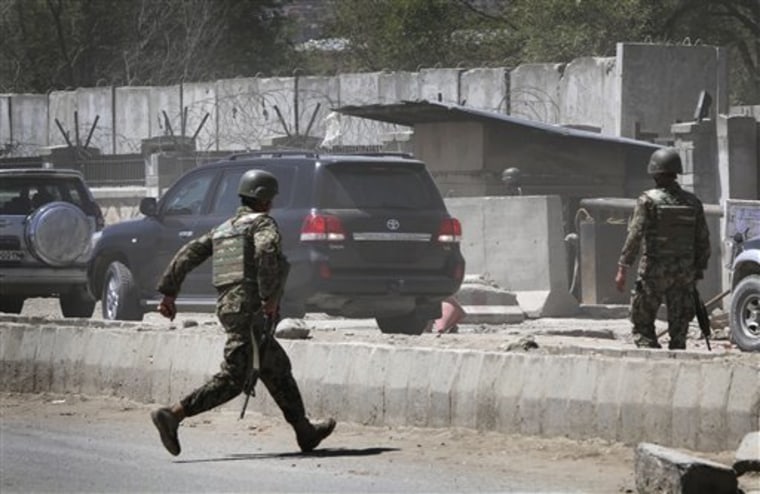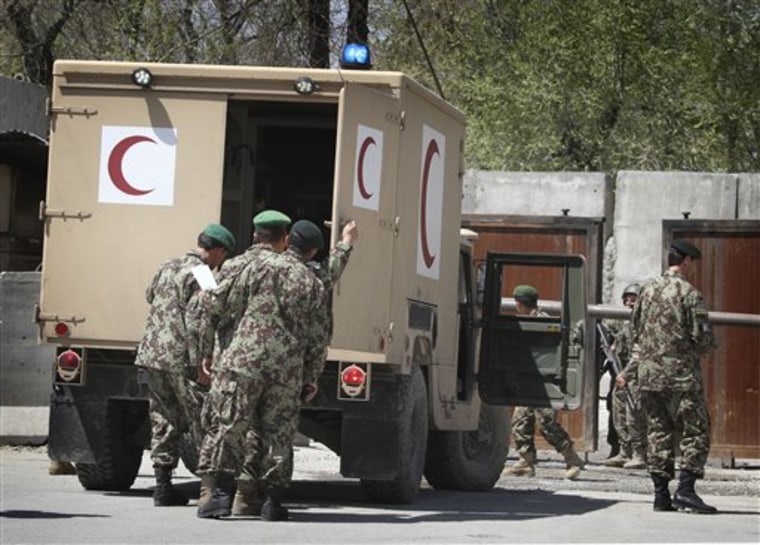A car with the license plate of a high-ranking Afghan general approached the gates of the Defense Ministry in Kabul last month. A special "A" pass also was on its windshield, so guards quickly waved it through.
Once inside, a man in an army uniform jumped from the car and stormed the ministry's main office building, an Afghan government official said. He gunned down two Afghan soldiers before being killed. The gunman also wounded an Afghan army officer, who died later at a hospital.
The April 18 attack — brazen and cleverly orchestrated by insurgents — is indicative of the high-profile yet small-scale attacks that are trademarks of the Taliban's spring campaign. Unable to match the firepower of the U.S.-led coalition and Afghan forces, insurgents conduct suicide bombings and assaults on government buildings, figuring these types of attacks will prove their resilience.
On Saturday, a suicide bomber wearing a police uniform detonated a vest laden with explosives at a provincial governor's compound in northern Afghanistan, killing two top Afghan police commanders and wounding the German general who commands NATO forces in the north. Two Germans and two other Afghans died.
It's unclear how deep of a dent the U.S.-led military campaign made in the insurgency over the winter or if these attacks are preludes to more widespread fighting by the Taliban this summer. Insurgents need to take back part of the southern provinces of Kandahar and Helmand, their traditional strongholds, if they hope to retain their power base and the opium fields that fund their movement.
"Certainly the types of attacks they are now doing is an indicator they don't want to send a large number of fighters against coalition or Afghan National Security Forces because they know they will get the worse of that," said Lt. Col. John Dorrian, a spokesman for the coalition. "The types of attacks they are doing are intended to create a propaganda flash and try to discredit the Afghan government."
Military and NATO officials, including the top commander in Afghanistan, Gen. David Petraeus, have predicted heavy fighting this summer. They have also predicted the Taliban will continue its campaign of terror and assassination. That campaign targets anyone who backs the Afghan security forces, peace talks with insurgents, or the Afghan government's reintegration program designed to lure Taliban foot soldiers back into their communities with offers of economic development for their villages.
"This is going to be a tough fighting season. The Talibs are not going to take these security gains laying down, and we have already seen them trying to come back. There are no certainties here," said British Maj. Gen. Phil Jones, a veteran of four tours in Afghanistan and NATO's point man on efforts to reintegrate Taliban fighters back into society.
Nearly all the Taliban's recent attacks have been on a small scale, with one or two notable exceptions in the mountainous northern province of Nuristan — a remote area where no permanent NATO or Afghan forces are deployed. Insurgents, however, have increased the tempo of assaults with attacks conducted by disgruntled Afghan soldiers and police or militants impersonating soldiers.
"The enemy is making huge efforts to infiltrate Afghan security organizations," Gen. Abdul Rahim Wardak, the Afghan defense minister, recently told parliament.
The Taliban claim that indirect tactics, such as suicide attacks, assassinations and infiltration, are part of their new strategy against the government.
"The mujahedeen are able to infiltrate into the ranks of the enemy and are using these opportunities to attack," Taliban spokesman Zabiullah Mujahid said after the attack.
Since September 2007, the coalition has recorded 21 incidents in which a member of the Afghan security forces — or someone in a uniform used by them — have killed coalition forces. Forty-nine coalition troops, including at least 35 Americans, have been killed. At least six members of the Afghan security forces also died in the incidents.
Of the 21 incidents, eight were attributed to combat stress or personal disagreements; seven were due to unknown motives; four involved members of the Afghan security forces who were co-opted by insurgents or sympathetic to the insurgency, and two involved attackers who were impersonating Afghan police or soldiers.
The sale of Afghan security force uniforms is banned in Afghanistan, but they are still easily obtained.
While insurgents have claimed credit for nearly all the attacks, no evidence has been found suggesting they have successfully embedded individuals in the Afghan security forces with the intent to attack coalition forces, training mission officials said.
In the two most recent attacks in Kabul, however, militants had inside help.

In the attack on the Defense Ministry, the man who drove the car with heavily tinted windows into the facility was the nephew of the general, the government official told The Associated Press. The official spoke on condition of anonymity because he was not authorized to disclose the information.
The Afghan army would never stop or search a vehicle driving into the ministry with a special pass on its windshield, the official said, adding that the general had not yet been told about the car or the involvement of his nephew, who is believed to have fled to Pakistan where many insurgent groups have safe havens.
The official said the investigation was still under way, and he would not elaborate as to why the general had not been questioned, or whether he even knew that a vehicle assigned to him by the ministry was used in the attack.
A month later, on May 21, the Afghan intelligence service said a soldier serving with the security unit at the main military hospital in Kabul picked up a Pakistani national and drove him to a mosque in the capital. There, inside a restroom, the man slipped an Afghan army uniform over a suicide explosives vest and got back into the soldier's official vehicle.
He was then easily driven through the gates. The attacker blew himself up in a tent being used as a cafeteria. The explosion killed six Afghan students and wounded 23 others. No foreigners were injured.
Police later arrested the driver — a soldier who had been in the army for eight months. NATO said the Taliban-affiliated Haqqani network was responsible.
